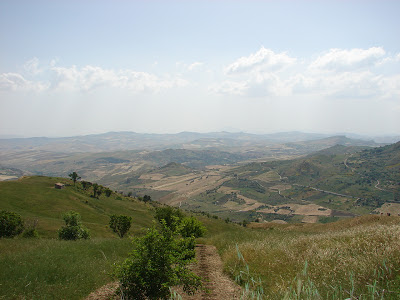 "Let me love the country, the rivers
running through the valleys, the streams and woodlands - happy though
unknown. Give me broad fields and sweeping rivers, lofty mountain ranges
in distant lands, cold precipitous valleys, where I may lie beneath the
enormous darkness of the branches." (Georgics, Virgil)
"Let me love the country, the rivers
running through the valleys, the streams and woodlands - happy though
unknown. Give me broad fields and sweeping rivers, lofty mountain ranges
in distant lands, cold precipitous valleys, where I may lie beneath the
enormous darkness of the branches." (Georgics, Virgil)One of the cognitive artifacts of my early childhood - a scrap of a memory - that occasionally returns to the forefront of my consciousness, is of leafing through an old book on Classical mythology in the bedroom of my great aunt and uncles Post Office, overlooking the village green in Market Stainton, Lincolnshire. I remember nothing of the words, but the illustrations of Greek and Roman gods and goddesses were imprinted, faintly but tenaciously, on my mind. And, maybe through wishful thinking false memory, the heroic scenes occupying the pages were played out across equally epic Arcadian landscapes. This, anyway, is the vision that has stuck with me.
 | |||
| 'Dream of Arcadia', Thomas Cole |
 My knowledge of Classical history and myth is shamingly sketchy, and I've always been somewhat envious of those who can authoritatively reference antiquity in prose and speech. However, and always striving to be a good polymath, from the springboard of the 'Lincolnshire book' memory I have a clear aesthetic vision of the Ancient Greco-Roman world, albeit an amalgam of the re-imaginings of successive waves of Western civilisation from the Renaissance onwards, given a Technicolor sheen through watching too many Hollywood 'sword-and-sandal' epics. This visualisation of places and times unvisited is emphatically Arcadian, populated by the spirits of Faunus, Silvanus and Pan, 'god of the wild countryside'.
My knowledge of Classical history and myth is shamingly sketchy, and I've always been somewhat envious of those who can authoritatively reference antiquity in prose and speech. However, and always striving to be a good polymath, from the springboard of the 'Lincolnshire book' memory I have a clear aesthetic vision of the Ancient Greco-Roman world, albeit an amalgam of the re-imaginings of successive waves of Western civilisation from the Renaissance onwards, given a Technicolor sheen through watching too many Hollywood 'sword-and-sandal' epics. This visualisation of places and times unvisited is emphatically Arcadian, populated by the spirits of Faunus, Silvanus and Pan, 'god of the wild countryside'.It is only recently that I have come to think of the inevitable reality that this blissful rurality and Pythagorean harmony is a construct of the mind. And largely the mind of the Roman poet Virgil. As Adam Nicolson explains,
"The Greeks had two kinds of primitivism: the soft version of the Golden Age, often set in Sicily, where there was plenty and happiness and none of the vices of modernity; and the harder kind, often found in the harsh Greek province of Arcadia in the Peloponnese, a tough, wild mountain country, where there were no comforts and none of the sweetness of groves and purling brooks, but whose shepherds were admirably virtuous and honest and comforted themselves in their primitive lives with their songs and their pipes....Virgil fused these two realms."
 A holiday in Sicily a few years ago (during which the photographs in this post were taken) enabled temporary immersion in the relics and ghosts of this landscape; the modern topography providing a convincing facimile. This imagery has been given more recent succor by dipping into a battered 1957 copy of Gilbert Highet's Poets in a Landscape, a scholarly but fascinating account of the places Roman poets, including Virgil, described and lived in (ex libris: Wheaton College Library, Wheaton, Illinois).
A holiday in Sicily a few years ago (during which the photographs in this post were taken) enabled temporary immersion in the relics and ghosts of this landscape; the modern topography providing a convincing facimile. This imagery has been given more recent succor by dipping into a battered 1957 copy of Gilbert Highet's Poets in a Landscape, a scholarly but fascinating account of the places Roman poets, including Virgil, described and lived in (ex libris: Wheaton College Library, Wheaton, Illinois).
And so, my vision of Arcadia - Virgil's "distant realms of nature" - lives on, by way of Lincolnshire, Sicily and Illinois. Perhaps powered by a yearning to be "...a fugitive from civilisation, the figure who recovers a kind of spiritual integrity and wisdom by immersion in the natural setting." (Malcolm Andrews).
Select Bibliography
Andrews, Malcolm, 1999. Landscape and Western Art. Oxford: Oxford University Press.
Anon, 1952. Everyman's Atlas of Ancient and Classical Geography. London: Dent.
Highet, Gilbert, 1957. Poets in a Landscape. New York: Alfred Knopf.
March, Jenny, 2008. The Penguin Book of Classical Myths. London: Penguin
Nicolson, Adam, 2008. Arcadia: The dream of perfection in Renaissance England. London: Harper Collins.
Rushby, Kevin, 2006. Paradise: A history of the idea that rules the world. London: Robinson.
Some Landscapes blog entry on Virgil's Georgics http://some-landscapes.blogspot.co.uk/2006/01/early-morning.html
Virgil Wikipedia entry http://en.wikipedia.org/wiki/Virgil


No comments:
Post a Comment
Please add your comments here.